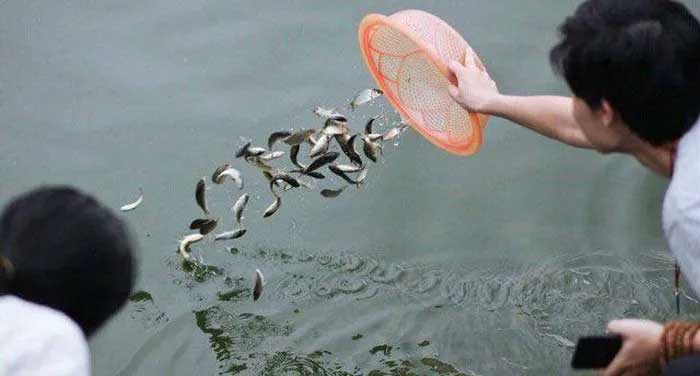The Lunar July is traditionally known as the Ghost Month. Many people actively release animals with the belief that it allows them to return to nature. However, releasing them incorrectly can also lead to their demise.
Animal Release Encourages Trafficking and Hunting
Humanitarianism, respect for, and appreciation of nature have long been regarded as beautiful cultural traditions among the Vietnamese people. This cultural beauty is a fundamental principle in the thoughts and actions of many and is often expressed through religious and spiritual activities such as animal release at temples and pagodas. Unfortunately, misunderstandings about the significance and nature of this activity have led to phenomena that not only violate the law but also impact the environment and wildlife conservation efforts.
Ms. Nguyen Thi Phuong Dung, Deputy Director of the Education for Nature Vietnam (ENV) Center, stated, “Animal release is a humanitarian activity, but we do not realize that the demand for purchasing animals to release, especially wild animals like birds, turtles, monkeys, etc., inadvertently facilitates the hunting and trafficking of these species.”

Releasing animals needs to be done correctly for them to survive.
“An increasing number of wild animals (WAs) in nature are becoming targets for illegal hunters and are being sold at religious establishments to serve the purpose of ‘doing good’ for some people,” Ms. Dung noted.
“The custom of animal release, which signifies doing good deeds and rescuing animals in distress, is commendable. However, this action needs to be performed correctly. Wild animals belong to nature! The best way to protect WAs is not to capture, consume, or trade them so that they can live freely in their natural environment.”
In agreement, Professor Dr. Dang Huy Huynh, Vice President of the Vietnam Nature and Environment Protection Association, stated that while animal release is a beautiful custom of the Vietnamese people, it is currently being distorted, resulting in adverse effects. It neither helps animals return to their natural habitats nor contributes to their survival.
For instance, releasing fish into a small pond can lead to overcrowding, with hundreds or thousands of fish being released into an environment that cannot support them. This excessive number severely impacts the ecological environment, forcing them to struggle for survival. Consequently, many fish die shortly after being released.
Similarly, when releasing birds in urban settings, the dense buildings make it difficult for them to find suitable shelter, turning them into easy prey for other animals.
|
According to the World Health Organization (WHO), about 70% of infectious diseases over the past 50 years have originated from wild animals. Direct contact with wild animals creates favorable conditions for humans to contract various dangerous viruses such as HIV/AIDS, avian flu, swine flu, SARS, Ebola, and MERS. The initial source of COVID-19 – the pandemic that is severely impacting the world – is also believed to likely originate from wild animals. Therefore, keeping wild animals in temples increases the risk of transmitting wildlife-borne diseases to humans. |
The Spirit of Animal Release Misunderstood
Dr. Vu The Khanh, General Director of the Union of Scientific and Technological Associations of Vietnam, believes that “the animal release that many people are currently practicing is merely superficial and not the essence. The purpose of animal release is to awaken compassion in each individual. The origin of animal release is to refrain from consuming fish and killing living beings. Subsequently, the spirit of animal release is to help any person or animal in distress.”
When encountering a lost bird or fish, one should extend a compassionate hand to help them return to their natural environment. However, buying birds or fish for release is merely a ritual. The act of purchasing creates a market for hunters to catch birds and fish for sale. During the capture and transport process, many animals die. Thus, the act of buying animals for release inadvertently contributes to their harm without our awareness. If we do not buy them, no one would catch them for sale.
“The current practice of animal release is being misused, seriously harming the natural environment without proper management. It is time for everyone to change their perception of this issue,” Professor Dr. Dang Huy Huynh stated.
Dr. Vu The Khanh suggests that instead of buying birds or fish for release, one should act according to the compassionate spirit of Buddhism, helping those in need and rescuing animals in distress so they can return to nature. The current trend of animal release lacks significance and even severely impacts the environment, leading to increased hunting of animals and shrinking habitats. Everyday compassion in our actions, thoughts, and deeds is the best way to practice animal release.
Professor Dr. Dang Huy Huynh believes that animal release should align with the ecological conditions of each locality and must be strictly managed. While animal release is a cultural issue, it poses serious environmental risks if left unchecked as it is today.
“Each person’s awareness must change; we should not fall too deeply into superstitions. There is no truth in believing that spending a lot of money to buy many animals for release will bring great blessings. In fact, buying many animals may lead to their quicker demise. If you wish to show compassion, use that money to help the poor, support underprivileged children to go to school, and lead better lives. Many people release animals without realizing that the creatures they buy are weak, and releasing them into the environment leads to their immediate death, turning a good deed into a bad one,” Professor Dr. Dang Huy Huynh shared.
Ms. Nguyen Thi Phuong Dung also advises that individuals can contribute to the protection of wild animals by committing not to consume products derived from them; encouraging family, friends, and those around them to avoid using wildlife products; and reporting acts of hunting, advertising, trafficking, and keeping wild animals to local authorities or calling the free hotline for wildlife protection at 1800-1522.
















































